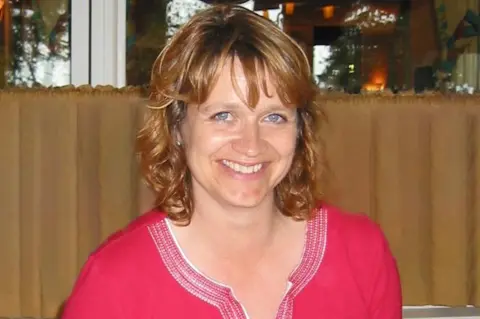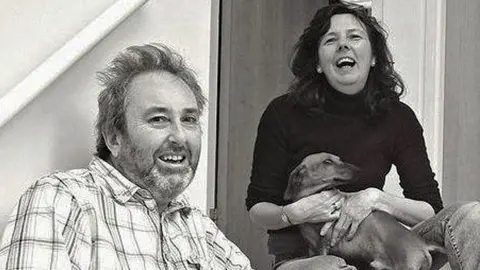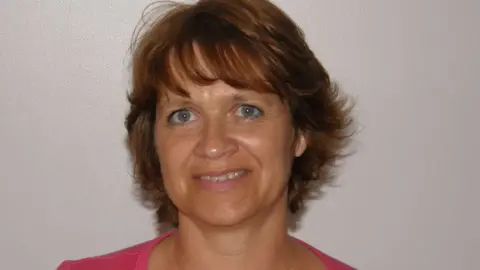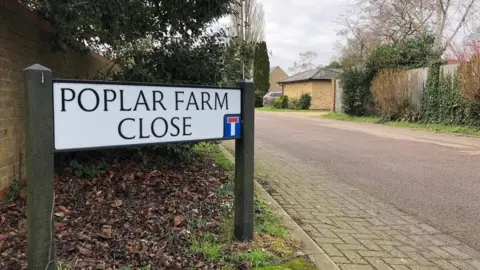Ian Stewart: Man who killed author guilty of murdering wife
 Family
FamilyA man who murdered a children's author in 2016 has been convicted of killing his wife six years earlier.
Ian Stewart, 61, was found guilty of murdering Diane Stewart at their home in Bassingbourn, Cambridgeshire.
Her death had been treated as epilepsy-related until he murdered his fiancee Helen Bailey and dumped her body in a cesspit at their Hertfordshire home.
Mr Justice Bryan sentenced Stewart to a whole-life order, meaning he will never be released from prison.
Evidence from Mrs Stewart's brain, which was donated to medical science, was used to help convict her husband.
In 2017, Stewart was convicted of secretly drugging and suffocating Ms Bailey in Royston, in a plot to inherit her fortune of some £4m.
He was jailed for life with a minimum 34-year term, and police then began to investigate the death of his wife in the garden of their home on 25 June 2010.
 South Beds News Agency
South Beds News AgencyIn his evidence at Huntingdon Crown Court, Stewart claimed on the day of Mrs Stewart's death he had driven to the supermarket to get French bread and pate to "celebrate" after their son's driving test, but returned home when he realised he had forgotten his wallet.
He said he saw Mrs Stewart "crumpled on the floor" and gave her CPR. He then told a 999 operator: "My wife had a fit. She's in the garden."
He told the operator his wife had epilepsy, but Mrs Stewart had not suffered a fit since 1992.
Mr Justice Bryan said: "Knowing, as we do, that you had killed your wife, it is harrowing to listen to that 999 call, which I am sure was a charade from start to finish.
"Diane was already dead, and you had murdered her."
The judge said Stewart had "in all probability" killed his wife "by a method that incapacitated her before she had any chance to fight back, most likely either a choke hold rendering her unconscious, or a plastic bag placed over the head from behind".
 Contributed
ContributedThe couple's sons, Oliver and Jamie, were out of the house at the time of the killing, the court heard.
In a statement released after the verdict, they called their mother "amazing".
"We were privileged to have a wonderful caring upbringing and we were supported through all the activities and hobbies that we undertook," they said.
"It's been really upsetting the last six years to have to recall the events of the toughest time of our life.
"We now look forward to recalling the many happy moments we had growing up as a family."
In a statement, Mrs Stewart's sister Wendy Bellamy-Lee and brother Christopher Lem said: "Diane was a very special, caring and capable person.
"She will always be greatly loved and hugely missed by her family and all who knew her."
An inquest concluded Mrs Stewart had suffered sudden death in epilepsy (SUDEP), which kills about 600 people in the UK each year.
While her body had been cremated, which police believe was done upon Stewart's instruction, he had consented to her brain being donated to medical science.
Prosecutor Stuart Trimmer QC told jurors scientists and pathologists were instructed to re-examine the circumstances, and analysis of the brain tissue indicated Mrs Stewart's death was "most likely caused by a prolonged restriction to her breathing from an outside source".
One consultant neurologist gave her risk of SUDEP at the time as "extremely low - one in 100,000", Mr Trimmer said.

Jurors also heard he received nearly £100,000 after Mrs Stewart died, including £28,500.21 in life insurance and the rest from her bank accounts.
Stewart went on to buy a red two-seater MG car, the court heard.
In evidence, Stewart claimed that he "didn't need that money, it was for the boys' futures" and said that type of vehicle was "what Diane and I had up until [their son] Jamie was born".
The judge, though, said he was satisfied that "the major motive for Diane's murder was for financial gain".
Jurors also heard from Alexandra Bailey, Mrs Stewart's friend from Salford University in the 1980s, who recalled Stewart's behaviour at the funeral as "a little odd."
"He seemed totally unbothered and seemed quite aloof," she said. "I just didn't feel it was right."
Six years after killing his wife, Stewart would go on to murder Ms Bailey, who wrote more than 20 books, including the popular Electra Brown series.
Ms Bailey was also known for her blog - Planet Grief - in which she talked about the death of her husband John Sinfield in 2011.
She had met Stewart through a bereavement website.
He had reported her missing three months before her body was found in the "foul-smelling" cesspit under their home in Royston alongside the corpse of her dachshund Boris.
Sentencing Stewart on Wednesday, Mr Justice Bryan told him the two women's deaths were in "chillingly similar circumstances".
He told Stewart: "You successfully passed off a murder as an epileptic fit in the circumstance I have identified, playing out an elaborate, and indeed sophisticated, charade over a period of time.
"A charade that succeeded at the time, and would have succeeded for all time but for your subsequent murder of Helen Bailey."
Det Supt Jerome Kent, who investigated both murders, revealed that when officers arrested Stewart - who by that time was serving a life sentence - for the murder of Mrs Stewart, the killer said: "Haven't you got anything better to do?"
"He's an intelligent man," Det Supt Kent said.
"He finds manipulating very easy to do. He can manipulate people, he can persuade people, he is extremely devious.
"I believe he is a narcissist, that it is all about him and about what he wants and the control he must have in his life."

Find BBC News: East of England on Facebook, Instagram and Twitter. If you have a story suggestion email [email protected]
